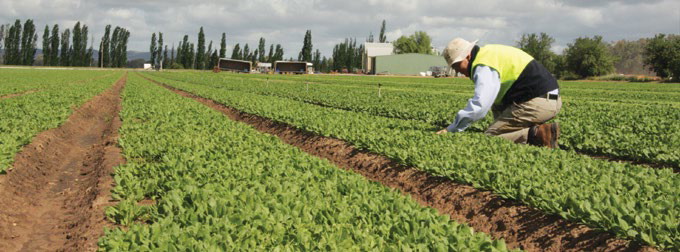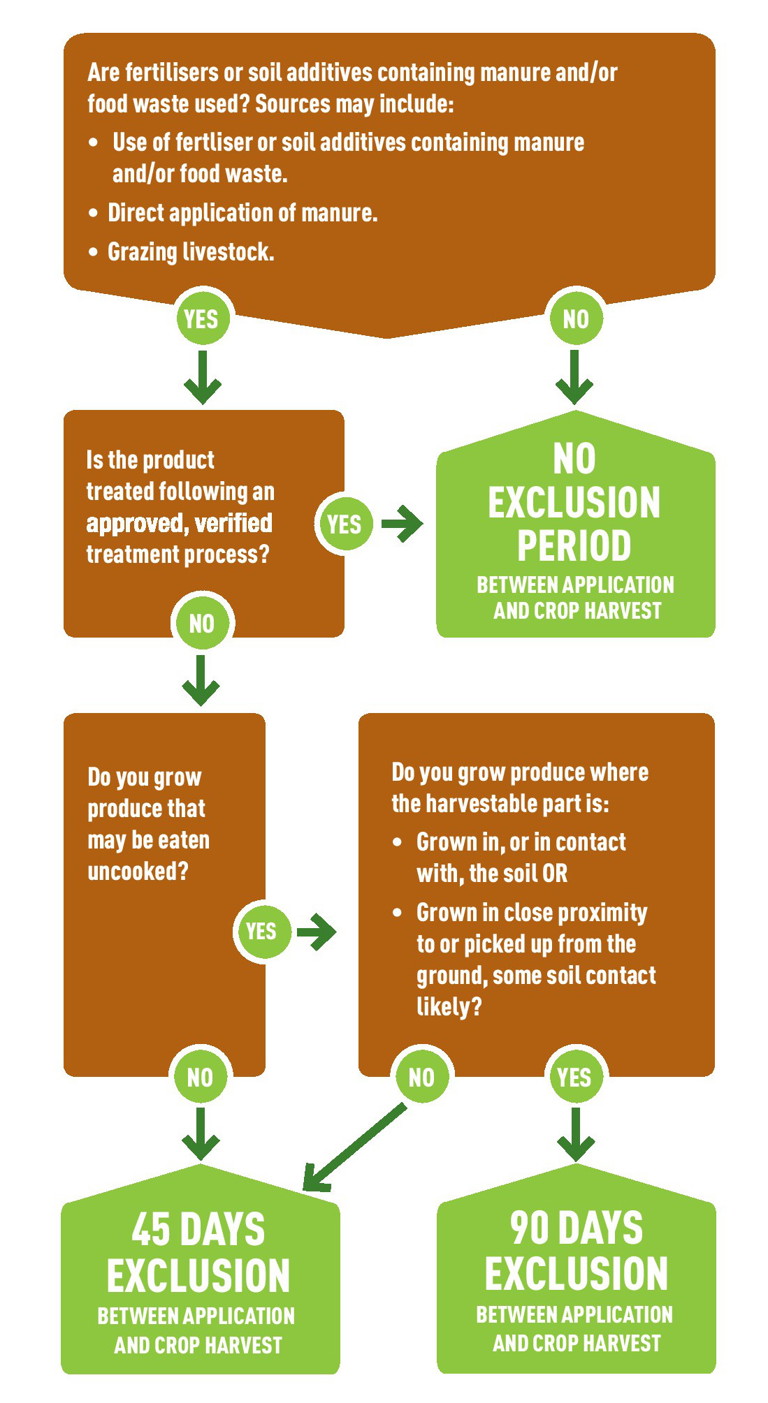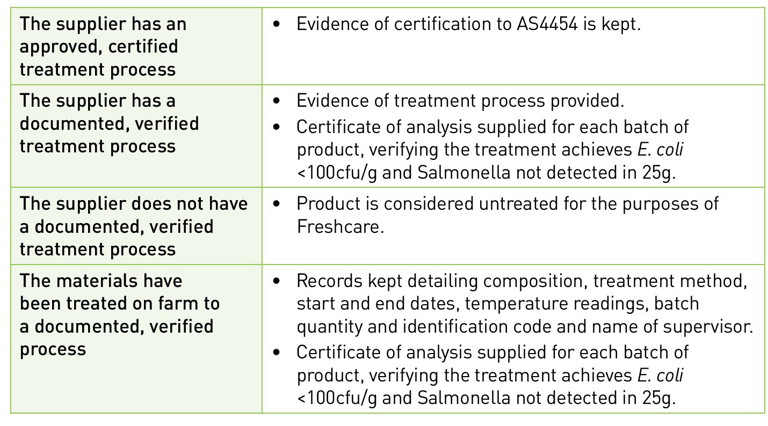Using compost safely
A guide for the use of recycled organics in horticulture

Compost is a mixture of recycled organic materials that have been processed by natural organisms, breaking down the original materials into a usable form. Compost has many benefits for soil. It can feed plants, stimulate beneficial microbes, improve soil structure and help the soil retain nutrients, water and warmth.
However, compost is also a potential source of microbial, chemical and physical contamination. Human pathogens in manure, heavy metals in sewage sludge and plastics left in green waste bins all have the potential to contaminate growing sites and fresh produce.
Growers may therefore be reluctant to use compost, in spite of its potential benefits, because of concerns about how it could affect the safety of the food they grow.
This guide describes how fresh produce growers can use compost without affecting their food safety assurance program.
My business is Freshcare certified — what products can I use?
There are many organic fertilisers and soil amendments that can be used without affecting Freshcare certification:
• Compost that has been pasteurised in accordance with the AS 4454-2012 Composts, soil conditioners and mulches (AS 4454), or an equivalent, verified time / temperature treatment, can be used without restrictions.
• If a composting treatment cannot be verified, the material must be managed as if it were untreated manure.
• If untreated manures are used, a minimum period must pass between application and harvest. In most cases 45 days is sufficient. However, a longer period of 90 days is required if soil contacts (or potentially contacts) the harvestable part, and the product may be eaten uncooked (Figure 1).
• Human effluent and biosolids must not be applied to horticultural production areas. N.B. Treated biosolids, present as a component in commercial composts, are acceptable.
Compost can feed plants, stimulate beneficial microbes, improve soil structure and help it to retain nutrients, water and warmth.
What do we mean by ‘recycled organics’?
Recycled organics are defined as any plant or animal material that has been collected through waste management systems and treated to make it usable.
A wide range of materials may be used, either individually or within a mixture, including:
• Green waste from forestry, land clearing, garden prunings and clippings and tree pruning
• Crop residues
• Spent mushroom compost
• Reject fruit and vegetables
• Organic materials from manufacturing (e.g. grape or olive marc, brewery waste)

FIGURE 1. DECISION TREE FOR USE OF FERTILISERS AND SOIL ADDITIVES (FROM FRESHCARE FSQ4).
• Food waste and used cooking oils (e.g. grease traps)
• Manure and bedding from livestock, horses, pigs and poultry
• Waste materials from abattoirs (e.g. blood, bone)
• Dead animals, unsuitable for consumption
• Sewage effluent and biosolids (sewage sludge).
Government regulations affect movement and use of organic materials. Please check with your supplier for guidance.
Making compost that’s safe
Microbial contaminants
For compost to be considered treated, the key minimum requirement is that the materials are thoroughly pasteurised. That is, the centre of the pile should reach:
• >55°C for three consecutive days prior to each of three turnings of the pile or windrow. If manures are included, as they usually are, then the centre of the pile should reach
• >55°C for three consecutive days prior to each of five turnings (Figure 2).
Turning also ensures that the pile does not become anaerobic (lacking oxygen), as this can increase growth of some human pathogens.
At the end of the composting period the pile should achieve E. coli <100cfu/g and Salmonella not detected in 25g. This is verified through testing.

FIGURE 2. TEMPERATURES INSIDE A COMPOST PILE CONTAINING MANURE. THE CORE TEMPERATURE NEEDS TO EXCEED 55°C FOR THREE CONSECUTIVE DAYS ON FIVE OCCASIONS, WITH THE PILE BEING TURNED AFTER EACH HEATING EVENT, FOR IT TO BE CONSIDERED PROPERLY COMPOSTED IN ACCORDANCE WITH AS4454.
TABLE 1. EVIDENCE OF COMPLIANCE.

Measuring changes in the temperature of the pile after turning can indicate the maturity of composted material:
• Immature product heats rapidly and continues to rise over time.
• Composted product will heat up, but then tend to decline.
• Mature composted product will heat slowly, if at all.
Shredding (to produce mulch), ageing, dehydration and anaerobic digestion do not provide the same heat treatment as composting.
This means the raw materials cannot be considered pasteurised.
Unless the feedstock can be proven as free from manures or other animal products, the same withholding periods should be observed as indicated in Figure 1.
Compost should not be applied when heavy rain or windy conditions are expected.
Physical and chemical contaminants
Compost containing physical contaminants introduces a potential food safety risk to growing areas. Compost must not contain more than 0.5% glass, 0.05% plastic or 5% stones/clay lumps as a minimum standard.
Compost must not exceed upper limits for chemical contaminants such as cadmium, lead, and many others as set out in detail in AS4454. Confirming heavy metal concentrations in a composted product is particularly important if soil levels are already high.
What else do I need to do?
If compost containing manure or food waste is applied within the exclusion period before harvest then evidence must be kept that it has been treated in accordance with an approved treatment process.
All composts, soil additives and other recycled organics must be stored so as to minimise any potential contamination of water sources and growing areas.
Compost should not be applied when heavy rain or windy conditions are expected. This will help avoid contamination of neighbouring crops or watercourses.
Freshcare certification also requires that records are kept of:
• Application date.
• Location and crop.
• Product used.
• Rate of application.
• Wind speed and direction.
• Method of application.
• Name of the person applying the material.
The bottom line
Many recycled organics products can be used without affecting Freshcare Certification.
• Compost can be used without restriction if it has been correctly treated to kill pathogenic microbes (compliant with AS4454).
• Products that have not been treated to kill pathogenic microbes can still be used, so long as either:
— They do not contain any manures or other materials of animal origin OR
— Withholding periods are observed between application and harvest.
• Contamination is of most concern if the crop is grown close to, or in contact with the soil, and may be eaten uncooked.
• Human effluent and untreated biosolids must not be applied to growing areas.
MORE INFORMATION
For further information on the use of composts and soil amendments in horticulture:
• Improving soil health: soilwealth.com.au
• Composts for soils: compostforsoils.com.au
• Recycled organics: mraconsulting.com.au
